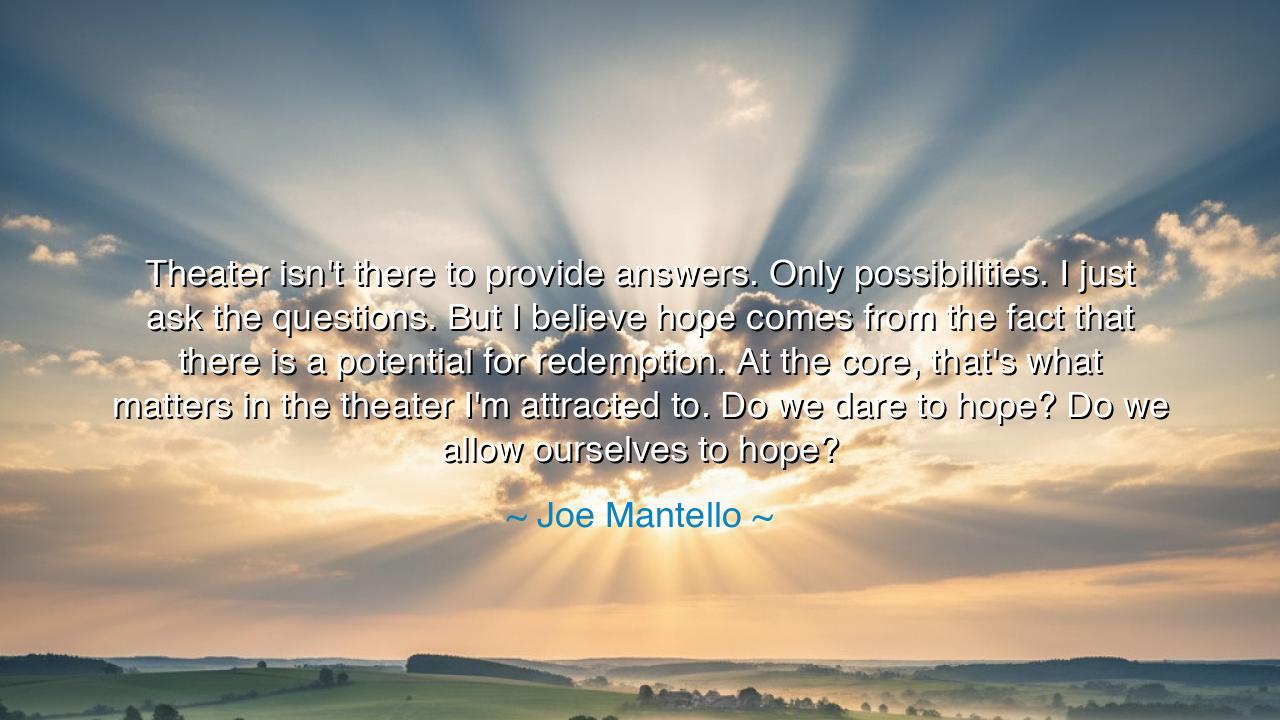
Theater isn't there to provide answers. Only possibilities. I
Theater isn't there to provide answers. Only possibilities. I just ask the questions. But I believe hope comes from the fact that there is a potential for redemption. At the core, that's what matters in the theater I'm attracted to. Do we dare to hope? Do we allow ourselves to hope?






In the luminous and contemplative words of Joe Mantello, a master of stage and soul, there breathes an ancient truth reborn for the modern age: “Theater isn’t there to provide answers. Only possibilities. I just ask the questions. But I believe hope comes from the fact that there is a potential for redemption. At the core, that’s what matters in the theater I’m attracted to. Do we dare to hope? Do we allow ourselves to hope?” These words, gentle yet searching, remind us that art — like life itself — is not a place of final answers, but of infinite awakening. The stage, Mantello tells us, is a mirror held up to the heart, where the audience must confront not certainty, but the trembling beauty of possibility.
The origin of this quote arises from Mantello’s long and distinguished journey as both actor and director, known for his profound interpretations of human complexity in works such as Angels in America, Wicked, and The Normal Heart. His theater is not about spectacle alone; it is about the moral and emotional struggles that define our shared existence. He speaks as a philosopher disguised in the garb of an artist — one who sees the stage not as a place of performance, but of revelation. Like the ancient dramatists of Greece — Sophocles, Euripides, Aeschylus — Mantello believes that theater is sacred ground, where the audience gathers not merely to be entertained, but to question what it means to be human.
When he says that theater isn’t there to provide answers, Mantello evokes a wisdom as old as tragedy itself. The Greeks knew that drama did not exist to soothe, but to stir; not to resolve, but to awaken the soul. When Oedipus blinds himself, when Antigone chooses death over dishonor, when Hamlet hesitates between action and doubt — none of these stories offer solutions. They offer reflection. The questions they raise echo through centuries: What is justice? What is truth? What is love? In the theater, as in life, we are not handed resolution — only the chance to look inward and discover what truth we dare to claim.
But Mantello’s words rise beyond questioning into something greater — hope. “Do we dare to hope?” he asks, not as a challenge, but as an invitation. For hope, in his vision, is the thread that connects tragedy to redemption. Every great play, however dark, contains a seed of renewal. When the curtain falls, the world may not be healed — but the heart has been touched by understanding, and that itself is redemption. Even in despair, there is a glimmer of light — the possibility that we can become better, kinder, more awake. The ancient playwright Euripides understood this when he wrote of Medea, a woman torn apart by vengeance. Her story is one of horror, yet hidden within it lies the question: can we forgive the unforgivable? Can we rise above our pain? Mantello’s theater of questions carries that same inheritance — it awakens hope not through certainty, but through the courage to face uncertainty with open hearts.
Consider the modern story of The Normal Heart, a play Mantello himself once brought to life with fierce tenderness. It tells of men dying in the early years of the AIDS crisis, their voices ignored, their love vilified, their humanity denied. Yet through the agony of that story burns a quiet fire — the fire of hope. The play does not offer an easy resolution. It does not promise redemption in the worldly sense. But it gives us something greater: the possibility of empathy, of awakening, of remembering. In that moment, theater becomes what Mantello calls “transcendental language” — not bound by words, but by the spirit’s movement from despair toward compassion.
What Mantello calls “redemption” is not the cleansing of sin, but the recognition of shared humanity. It is the soft light that dawns after understanding another’s pain. The stage, he tells us, is a sanctuary where all are equal — the sinner and the saint, the lost and the found. In theater, we do not judge, we behold. The mask falls, and the soul speaks. To watch a play is to confront the reflection of our own hearts, to ask: “Could I be that cruel? Could I be that kind?” When we leave the theater changed — not with answers, but with compassion — that is redemption.
So, my child of tomorrow, remember this: the questions are the beginning of wisdom, and hope is its final note. Do not seek from life or art the comfort of certainty; seek instead the fire of curiosity, the courage to ask, and the humility to listen. Allow yourself to be moved by the stories of others, for in them lies the map of your own becoming. Hope does not demand perfection — it asks only that you believe in the possibility of change, both in yourself and in the world.
For as Joe Mantello teaches, theater, like life, is a sacred act of questioning, a dance between shadow and light. It does not promise answers, but it promises transformation. To hope — even when the world offers none — is itself the greatest act of faith. And if we can still hope, if we still dare to believe in redemption, then we are already halfway to it.






AAdministratorAdministrator
Welcome, honored guests. Please leave a comment, we will respond soon